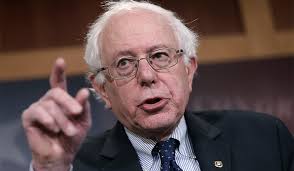Voters have expressed widespread disaffection with Democrats, Republicans and their likely nominees, Hillary Clinton and Donald Trump, throughout this presidential election year. Some Bernie Sanders supporters have declared that they will cast a write-in ballot for Bernie if he does not win the Democratic Party nomination. I spoke with Richard Winger, author of Ballot Access News, about why writing in Bernie isn’t nearly as easy as it might sound.
Ann Garrison: Richard, first I want to let readers know that you’re this country’s expert on third party ballot access. Whenever I’ve asked anyone else a difficult question about ballot access laws or ballot access history, the answer is always “Ask Richard Winger.” How long have you been publishing Ballot Access News?
Richard Winger: Thirty-one years, but I’ve been interested in this ballot access problem for 50 years. I’m 72 and I got interested when I was in college in Berkeley.
AG: OK, there seem to be a lot of frustrated Bernie Sanders supporters imagining that they can simply write in Bernie Sanders and have their vote counted. Could you explain the problem with this?
RW: Well, every state writes its own election rules even for federal elections, and most states do permit write-ins, but they will only count write-ins for write-in candidates who filed a declaration of write-in candidacy. And I’m pretty sure that Bernie Sanders is never going to file as a declared write-in candidate for the general election because that would be considered very hostile to the Democratic Party. So the way it stands now, in almost all states . . . people who write in Bernie Sanders in November . . . those votes will never ever be counted. No one will ever know about them, although there are about six states where they would be counted.
However, if people are determined that the tally be made of how many people write-in Bernie Sanders in November, there is something people can do even assuming Bernie Sanders won’t file as a declared write-in. Some other person named Bernie Sanders could do that, and so they’d have to count ’em.
AG: OK, but dubious as it is that the real Bernie Sanders would encourage this kind of political theatre, how high are the barriers to registering as a write-in? What do you have to do in the various states? Do you have to file petitions or pay fees?
RW: There’s only one state that requires a petition. That’s North Carolina. They force a declared write-in candidate to file a petition of 500 signatures. And I think there’s one or two states that would require a fee, although there are several courts that have held it’s unconstitutional to force write-in candidates to pay a filing fee. And even in the few states that have it, it’s a small amount of money.
It’s mainly all the work, because the bulk of the work means finding slates of presidential elector candidates because they have to be part of the filing.
AG: So Bernie Sanders, or any other candidate who wanted to be a write in, couldn’t just file to run as a write-in. They’d have to file a list of electors, right?
RW: That’s exactly right and the reason for that is, under our Constitution, in November, people think they’re voting for president, but they’re not. They’re voting for candidates for presidential elector. And the people who win those elections, they then pick the president in December. You’re right; we have to line up slates of presidential electors.
AG: So it’s not a simple process. Just, for example, how large a list of electors needs to be filed in California?
RW: Well, of course California’s the most populous state. We have 55 electoral votes. Every one of those 55 people has to file a declaration of candidacy and it has to be notarized, which is really really silly, but that’s the State of California for you.

